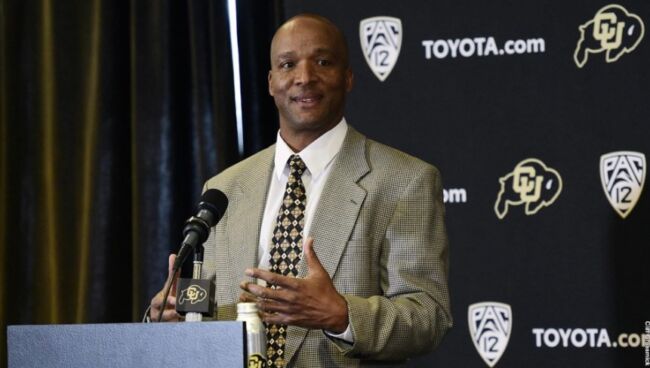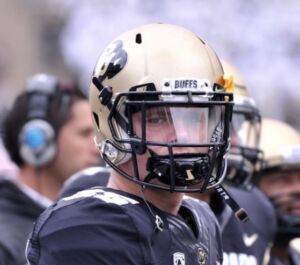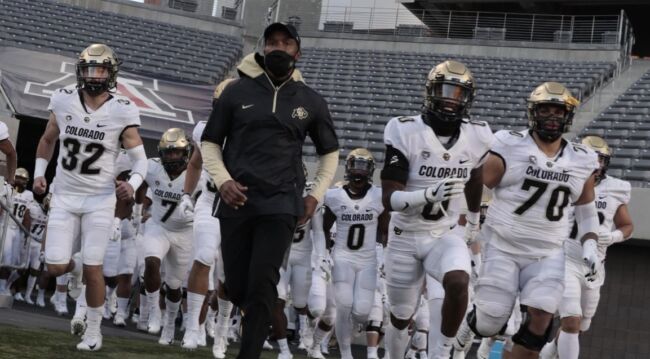A Look Back at the Past Year with the CU Football Program
By Britney Eschelman
Things can change faster than a blink of an eye. And for the Colorado Buffaloes football team, Feb. 11, 2020 was certainly a day that saw a major shift in the program.
Deion Smith remembers how quickly the turn of events occurred on this day all too well. The day before former head coach Mel Tucker announced his resignation from the CU football program, Smith deleted all of his social media from his phone. He wanted a break and felt like he had been on his phone too much. However, Smith wasn’t going to get the phone detox he was looking for after all when word got out that Tucker was indeed leaving the Buffs. After a long nap on the night of Feb. 11, Smith woke up to at least 10 missed calls and texts from teammates, family members and friends about the breaking news.
“Everyone was just confused, you know. Shocked. A lot of people were angry and some people were even ready to leave,” says Smith.
The team was shocked, to say the least, and Smith remembers a negative energy surrounding the team environment following the news. But amidst all the chaos and confusion, positive news was heading their way. Just 12 days later, Colorado found their perfect match: Karl Dorrell, who had an impeccable resume filled with coaching experiences that ranged from offensive coordinator and wide receiver coach at a variety of collegiate programs to assistant coaching for the Miami Dolphins National Football League (NFL) team. Aside from his prior experience, the most important quality was his years as the assistant coach for Colorado, twice, in the 1990s.

“When Colorado came and asked if I was interested in the job, it felt like a dream come true,” said Dorrell. “I’ve been very fond of this program since coaching here twice in the ’90s and had a lot of success here. So when the job was offered, I was ecstatic.” A glimpse of hope was now restored to the Buffs once again when Dorrell announced he was all in. Spring practice was coming up quickly and Dorrell was ready to get going with his team. He began forming relationships with the players immediately, and especially his upperclassmen.

Jared Poplawski, a junior tight-end on the CU football team, has faced a number of injuries during his time at Colorado. From tearing his left ACL going into his freshman year, then tearing both his shoulder and right ACL his sophomore year, he’s been in a limbo between recovery and health most of his career. Because of his injuries, Poplawski felt that not every coach saw him as an asset to the team, even though he played right away in five out of the first six games his first year on the team and worked tirelessly after each physical setback.
But when Dorrell came in, Poplawski felt hopeful again. “When I met Dorrell, I thought he was going to think I was too injury-prone and didn’t care about football anymore. But he really gave me a chance and told me that he needed me to get healthy so I could play. It was the first time since prior head football coach Mike Macintyre that I felt like a coach believed in me,” said Poplawski. In fact, Dorrell told Poplawski that the coaches and team would need to rely on him in a leadership role because of his experience learning three different offenses with three different coaches.
Unfortunately, the dream job Dorrell had planned for was affected by external factors. Only a month after Dorrell was announced new head football coach, the World Health Organization (WHO) declared that COVID-19 was considered a pandemic on March 11, 2020. Schools, businesses, and normal functioning life began to shut down due to this virus.
I vividly remember hearing of the CU students abroad being sent home from their programs and colleges cancelling in-person instruction for the rest of the semester. I was shocked, frantically checking my school email’s inbox each day to see if we too were being shut down and sent home. On March 16, Chancellor Phillip DiStefano announced that students should head home if they could, as well as confirming that we had switched to remote teaching and learning for the rest of the academic school year. That glimmer of hope with Coach Dorrell plummeted once COVID-19 suffocated our day-today livelihoods.
The first initial quarantine phase from March to May was not easy for the CU football program.“We had to use a lot of Zoom meetings to pretty much install our system and we were still under the impression that we were going to have some form of pre-season training over the summer, but that didn’t happen either,” says Dorrell. “Not having much meeting time in-person, not doing any drill work, not even doing just pods of receivers and quarterbacks going to throw the ball around. We just didn’t have any of those opportunities. That was very, very challenging.”
It became evident over time that spring season and summer pre-season were clearly off the table. But was a fall season still up for grabs? When 3 of the power 5 football conferences–the Atlantic Coast Conference (ACC), Southeastern Conference (SEC), and Big 12–announced their fall season opener dates at the end of July, many of the teams in the Pacific-12 Conference (Pac-12) grew concerned as to why they had not heard an announcement about their fall season opener. Colorado’s coaches and teammates felt unsure of what to assume.
In the event that the Pac-12 announced a fall season, Colorado needed to prepare. Football players regularly lift weights and use heavy lifting machinery to maintain their physical fitness. With workout facilities shut down, this posed another obstacle. C.J. Schmanski, sophomore, is one of the tight ends on the team and told me what staying in shape looked like during this time. “It was a lot of pushups and running around the park by yourself. Some people were even lifting big logs or buckets of rocks,” said Schmanski. When playing a high-intensity sport like football, it’s easy to recognize that lifting logs and buckets of rocks doesn’t necessarily cut it as great workout material. Given the circumstances, players were desperate for anything that would help them stay fit.
Finally, on October 3, the Pac-12 released their statement announcing that the conference would be playing seven conference-only games for the season. Each game had to be played in accordance with the Pac-12 COVID-19 Medical Advisory Committee health and safety guidelines. For the first time in a while, there was some certainty that a season would be played out even if it wasn’t fully normal.
Schmanski recalled the day that the Pac-12 announced the fall season schedule. He went home for some time to be with his family but still remained masked up to protect himself and his loved ones. Relaxing at home one day, the text tone on his phone rang. A text from Dorrell said that Colorado would be having a season. “Everyone was just lit up,” he said. “All of the uncertainty of us being on-and-off and on-and-off, moving into a hotel to follow regulations, just all of the stuff we had to go through, it didn’t even matter who we were playing because we were going to go out there and have fun with it.”
The past few months had been difficult and everyone was excited to get going, but now the real hard work began. Dorrell explained that preparations for the shortened season began on October 9, which amounted to 29 days to do 24 practices before the first game. Since players were either in Boulder or at their respective homes out of state, everyone was training differently. Poplawski said that a lot of the lineman and skill player positions were not in the physical shape they should’ve been, which posed another obstacle. Heading into this, Dorrell preached the mindset to overcome the challenges and maximize every practice opportunity. Focus was everything and time was of the essence. “The biggest challenge was collectively getting the team in football shape to play,” Dorrell recalled. After everything, he was pleased to see that the team pushed harder than ever each practice, stayed on top of their health, and committed themselves to the season.
As Poplawski reflected on the team’s past relationships with Coach Macintyre (2013-2017) and Coach Tucker (2018-2020), he placed them in two different categories: Macintyre was kind but lacked respect from the team, while Tucker was extremely disciplined and held respect out of fear. With Dorrell, Poplawaski noticed a change in the team environment. “People were working hard because they wanted to play well for their coaches, not because they feared the coaches,” he said. To like a coach is one thing. To respect a coach is a whole other thing. To have both on your side is the perfect recipe for success.
The team was grinding hard at work, but one of the biggest obstacles was juggling coronavirus precautions. The team and coaches had extensive amounts of COVID-19 guidelines stacked up. The University of Colorado football program schedules its meetings and practices in the morning so the team can fulfill their school requirements in the afternoon. Each morning before their 7 o’clock meetings, every player and every coach had to clear a COVID-19 test in order to meet and practice. To get everyone tested and cleared took around 2 hours. So players would have to be in the building every weekday morning by 5:15 a.m. just to see if they would be able to practice that day and play that week. “We were stressed,” said Dorrell.
However, through all the stress with covid, physical setbacks, and time restrictions, the Buffs managed to pull off a 4-2 overall season record and played each game to their full potential. Fewer than a thousand fans and cardboard cutouts filled stadium seats and set a different tone from game days the previous season. Typically, Folsom Field can sit 50,000 fans for one game. Because the crowd cheers are so loud in a normal season game, it’s crucial for the players to zone out the noise in order to remain focused on the play of the game. But with hardly any fans in the stands and little noise to ignore this season, Schmanski said, “I thought it would be kind of the same thing, except there was nothing to zone out.”
The upside to no fans for Schmanski was that communication between the offense was better than ever before. “At the end of the day, that crowd noise can get to you sometimes,” said Schmanski thinking about a regular season fan filled stadium. At one point, he remembered hearing the other team’s offensive calls and recognizing which routes the other team was running by familiarity of the play names being yelled.

In order to build a strong team environment, the bond between players and coaches is everything. The team bonded faster than normal because they needed to for the shortened season, and circumstances got even more intense nearing the end. At the start of October 2020, the entire team moved into the Millenium Harvest House hotel for the same amount of time as their usual fall camp, which typically lasts around three to four weeks. Fall camp is designed to help teammates strengthen their relationships, skills and stay healthy for the season. “To eliminate people from getting positive COVID tests and eliminate people from having to quarantine, we were able to sleep at the Millenium and form our own little bubble,” says Smith.
And when the Boulder campus shut down all in-person operations after Thanksgiving break, the freshman football members living in the dorms either had to move into a hotel (again) or into off-campus housing they could find. The team kept their main focus: the upcoming Alamo Bowl Game in San Antonio, Texas, against the Texas Longhorns. Dorrell was amazed by the resilience of these young men on his team. He knew none of this was easy, but he also knew this team was persistent.
As the season came to an end, the Alamo Bowl game did not finish in a win, but Schmanski didn’t remember the loss as a downfall. Players were allowed up to six tickets for family and friends to attend the game, under COVID-19 guidelines. “It was just fun getting to run out of the tunnel with some noise,” he recalled.“It was super fun seeing the people and getting to play in front of somebody again.”
“It kind of felt like everything was worth it,” says Smith when thinking about all of the constant uncertainty the team had to deal with from the coaching change, to cancelling spring practice and then bouncing back-and-forth between having a fall season or not. “It was just reassurance to where we had a better team than we thought because we overcame so many obstacles and still had success overall.”
Reflecting on his past coaching experience, Dorrell was most impressed by the support from the Colorado athletic department. “I’m really appreciative of the effort to maximize the resources the athletic department could offer given the Boulder County health guidelines and CDC guidelines.” Most importantly, he feels the entire program has come together as a family given the circumstances this past year.
Amidst all the loss and restrictions of the pandemic, it has taught us all that a positive outlook can change your perspective on so many things. It has shown us that being in-person with our friends, family, teammates, and coaches is something we should cherish every day. It’s funny to think about all the times that I wanted to skip class, cheer practice, social events, or even big family dinners. Now, there’s nothing that I want to do more than go to an in-person class where I can actually see people’s faces, or go to a huge football game where no one cares about anything else except which team they’re rooting for to win.
“There’s a deeper appreciation about how we interact with people and how we spend time with each other,” said Dorrell. Heading into the 2021 season, as precautions around COVID-19 begin to lessen and people get their vaccinations, the program as a whole is looking forward to building off of the bond from last season and getting to work in more normal conditions.
“Regardless of all of the things that are going on around us, we can only control what we can control,” says Smith when talking about his biggest lesson from this past year and the 2020 season. One thing they know for sure is that whatever is thrown at them, resilience is everything.

